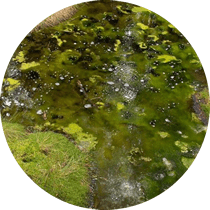
Drinking water limits: The parameter “odor” must be “acceptable”; its own limit for hydrogen sulphide is not set
- The smell of corrupted eggs
- Dark turbidity
- Toxicity
- at extreme concentrations respiratory tract irritation
- Edema of the lungs, eye irritation, respiratory arrest
Removal of hydrogen sulfide water
- Solution principle: oxidation of water
Hydrogen sulphide (sulfane – H2) is the simplest and most important sulfur compound with hydrogen. Hydrogen sulphide is a colorless gas, often formed by the decomposition of organic material and sulphates in the absence of oxygen.
Typical smell is the odor of eggs. Hydrogen sulfide is readily soluble in both water and alcohol. Hydrogen sulfide is usually found in volcanic gases that are emitted by eruptions.
Hydrogen sulfide causes an unpleasant smell of corrupted eggs. High iron levels are often accompanied by increased turbidity.
Hydrogen chloride in water is usually removed by strong oxidation of water. Such an oxidation reaction takes place by aeration, which ensures sufficient access of oxygen to water or a strong oxidizing agent.
